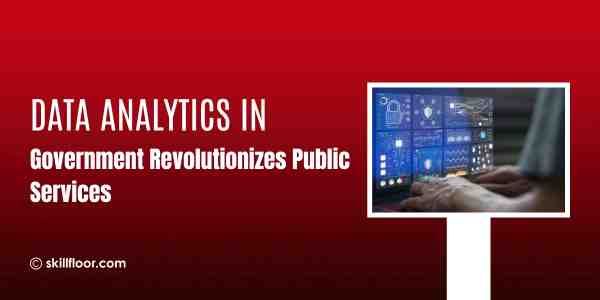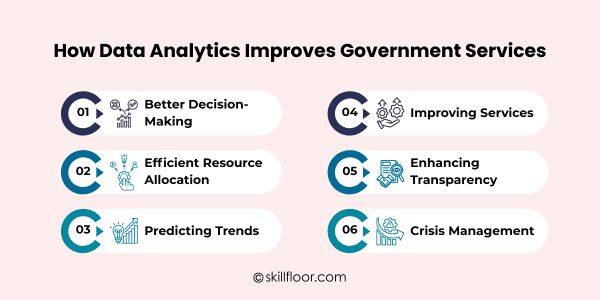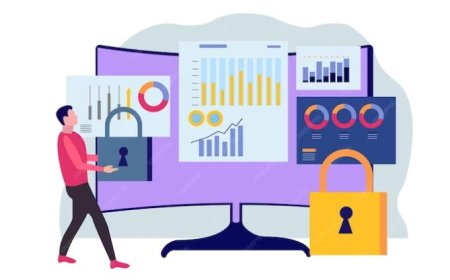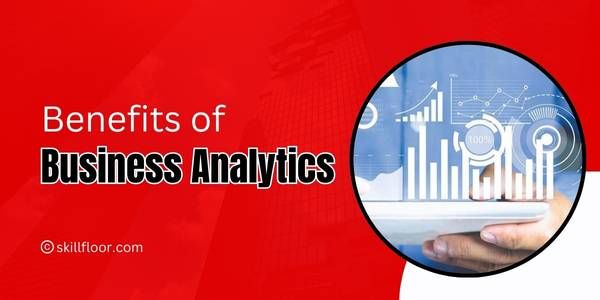Data Analytics in Government: Enhancing Public Services
Discover how Data Analytics in Government transforms public services, boosts transparency, and creates smarter, citizen-focused systems for better governance.

Governments now have access to a vast amount of data, and those that effectively utilize it are progressing faster than ever. Every day, large volumes of data are collected from welfare programs, hospitals, schools, transportation services, and tax systems across the nation.
By employing data analytics, governments can identify patterns and trends within these massive data sets. This allows officials to make informed decisions proactively, rather than waiting for problems to arise or worsen. This shift enables authorities to develop better policies and improve services before issues escalate or become costly.
Public services become easier and more dependable when governments use data properly. Traffic systems can cut down on delays, hospitals can anticipate patient demands, and welfare assistance can reach the right people. To put it simply, data analytics improves the way governments serve their constituents.
What is Data Analytics?
Analysing data to identify trends, patterns, and valuable insights is known as data analytics. Data is gathered by organizations from a variety of sources, including surveys, websites, and gadgets. They can comprehend what is going on and make better decisions that aid in enhancing outcomes or address issues by closely examining this data.
Numbers are important, but so is learning from them. Businesses, governments, and even educational institutions may make better judgments with the use of data analytics. It can display, for instance, which goods consumers prefer, how traffic flows across a city, or which services need enhancement. It transforms unprocessed data into useful information.
Why Data Analytics in Government Is No Longer Optional
This is about keeping up, not just updating systems. Disasters increase, cities expand quickly, healthcare issues arise, and budgets get smaller. Smarter tools and quicker, data-driven judgments are necessary for difficult problems.
Data analytics enables governments to:
-
Predict future service demand
-
Optimize resource allocation
-
Detect fraud and misuse
-
Improve citizen satisfaction
-
Increase transparency and accountability
Over 99% of public services are now available online due to the development of nearly entirely digital public services in nations like Estonia. People's expectations of the government are permanently raised once they witness such efficiency.
Key Areas Where Data Analytics is Transforming Public Services
1. Public Health Management
The worldwide reaction to COVID-19 illustrated the importance of data analytics. To monitor infection rates, distribute hospital beds, forecast case surges, and oversee vaccination distribution, governments employed real-time dashboards.
These days, predictive modeling aids in better public health planning, medical supply chain optimization, and early disease outbreak detection.
2. Smart Cities and Urban Planning
Data is essential to the proper operation of modern towns. Governments examine real-time data using environmental monitoring tools, traffic sensors, and surveillance systems to spot trends and improve decision-making, demonstrating the importance of data analytics in enhancing urban life. This aids in:
-
Reduce traffic congestion
-
Improve waste management
-
Optimize energy consumption
-
Enhance public transportation
The goal of programs like India's Smart Cities Mission is to use technology-driven insights to build sustainable and livable urban settings.
3. Taxation and Revenue Collection
Data analytics is a potent tool for enhancing tax compliance and identifying fraud. Governments can stop revenue loss and reveal tax evasion by spotting odd transaction patterns.
Automated risk scoring systems increase efficiency and decrease needless audits for compliant taxpayers by assisting authorities in concentrating on high-risk cases.
4. Social Welfare and Subsidy Distribution
Ensuring that benefits reach the right recipients is one of the biggest challenges in delivering public services. Data analytics plays a crucial role in detecting fraud, eliminating duplicate claims, and targeting subsidies more accurately.
For example, India’s Aadhaar system has enabled direct disbursement of benefits, eliminated middlemen and enhanced the transparency of welfare programs.
5. Law Enforcement and Public Safety
Law enforcement organizations can pinpoint crime hotspots and strategically deploy resources by examining crime data, geographic trends, and historical records.
Through better public safety planning and emergency response times, predictive analytics contributes to safer communities by enabling well-informed decision-making.
6. Environment and Disaster Safety
Governments utilize data analytics to keep an eye on climate trends, water pollution, and air quality in order to safeguard the environment and public health.
By anticipating floods, cyclones, or wildfires, it also facilitates a quicker response to disasters by enabling authorities to make resource allocations, alert the public, and minimize damage before it occurs.
How Data Analytics Improves Government Services
1. Better Decision-Making
Governments can see issues and possibilities clearly thanks to data analytics. Officials can enhance public services more effectively by employing data analysis to make quicker and more intelligent decisions.
-
Recognize which initiatives are successful and which require enhancement.
-
Keep an eye on real-time data to make swift policy adjustments.
-
Analyze past patterns to forecast future results.
-
Make high-impact activities a priority by using insights.
2. Efficient Resource Allocation
Governments can direct resources where they are most needed by researching the needs of their citizens. This guarantees the most efficient use of time, funds, and efforts for the benefit of the general population.
-
Direct healthcare workers to high-need regions.
-
Plan new schools in growing neighborhoods.
-
Ensure emergency supplies reach critical areas fast.
-
Reduce waste by tracking inventory and usage patterns.
3. Predicting Trends
Governments are able to predict changes in the economy, disease outbreaks, and population increase. By using predictive insights, administrators may make plans in advance, reducing issues and enhancing community readiness.
-
Predict traffic congestion to improve city planning.
-
Identify areas at risk of epidemics.
-
Forecast education demand in growing communities.
-
Plan budgets based on economic trends and needs.

4. Improving Services
Governments may improve services like healthcare, education, and welfare to better fulfil the needs of the public and clearly identify service gaps by integrating user feedback with visualization.
-
Track citizen complaints to fix common issues.
-
Evaluate school performance to enhance education quality.
-
Monitor hospital efficiency to improve patient care.
-
Adjust public programs based on measurable outcomes.
5. Enhancing Transparency
Governments can use data analytics to demonstrate to the public how choices are made. Open insights increase accountability and trust, which improves the transparency and comprehensibility of government.
-
Publish public spending dashboards for accountability.
-
Share project progress through clear charts and graphs.
-
Make policy decisions backed by visible data.
-
Enable citizens to understand government actions easily.
6. Crisis Management
Governments depend on real-time data during emergencies to efficiently coordinate many agencies, react swiftly, increase safety, and lessen the impact on people.
-
Track natural disasters to deploy relief efficiently.
-
Predict disease outbreaks to prevent wider spread.
-
Monitor emergency response times for faster action.
-
Coordinate multiple agencies using live data dashboards.
Benefits of Data Analytics in Government
The adoption of analytics delivers measurable improvements:
1. Improved Efficiency
By automating procedures, cutting down on paperwork, and expediting work, data analytics frees up officials to concentrate on residents' top priorities.
2. Evidence-Based Policymaking
Real data, not conjecture, informs decisions, guaranteeing that policies are impactful, quantifiable, and effective for communities.
3. Greater Transparency and Accountability
By enabling citizens to observe government actions, open dashboards and portals foster accountability, increase public operations visibility, and build confidence.
4. Personalized Citizen Services
Governments can effectively provide services that are suited to particular populations or geographical areas by using data analysis to understand citizen requirements.
5. Faster Crisis Response
Governments can save lives by detecting emergencies, coordinating many agencies, and reacting quickly to outbreaks or disasters thanks to real-time insights.
6. Better Resource Allocation
Analytics reduces waste while enhancing services by identifying high-need areas, tracking usage trends, and allocating resources, personnel, and supplies sensibly.
Real-Life Examples of Data Analytics Transforming Public Services
Using real-time insights and predictive technologies, data analytics assists governments in making better decisions, increasing efficiency, and providing residents with better services.
1. Healthcare
Hospitals employ data analytics to forecast patient requirements, cut down on wait times, and efficiently distribute medical personnel around different areas.
2. Traffic Management
Cities use traffic pattern analysis to enhance daily travel times for residents, optimize signals, and lessen congestion.
3. Public Safety
Analytics are used by police departments to proactively enhance community safety, deploy officers effectively, and identify crime hotspots.
4. Education
In order to effectively enhance overall academic outcomes and offer individualized learning programs, schools monitor trends in student performance.
5. Disaster Response
To swiftly deploy emergency services and lessen the impact on impacted communities, governments keep an eye on weather and disaster data.
6. Budget Planning
In order to maximize social benefits, cut waste, and optimize public finances, agencies examine expenditure patterns.
Technologies Powering Government Analytics
The success of data-driven governance depends on strong technological foundations:
1. Big Data Platforms
These platforms manage extensive government databases, allowing authorities to effectively store, process, and analyze vast volumes of data.
2. Cloud Computing
Without requiring a lot of local hardware, governments may securely store data and enable analytics applications thanks to cloud infrastructure's scalable storage and processing capabilities.
3. Artificial Intelligence & Machine Learning
Governments can make quicker, more informed choices by using AI and ML to forecast trends, identify anomalies, and produce actionable insights.
4. Geographic Information Systems (GIS)
Governments can use GIS technology to analyze spatial data and aid in infrastructure development, resource distribution, urban planning, and disaster management.
5. Interactive Dashboards
Dashboards give government officials access to real-time data visualizations, allowing them to keep an eye on operations, evaluate performance, and react swiftly to new problems.
6. Supporting Organizations
Organizations such as the US Digital Service and the National Informatics Centre assist governments in successfully advancing digital transformation projects and deploying analytics technologies.
Challenges in Implementing Data Analytics in Government
1. Data Silos
Departments frequently keep data independently, which makes it challenging to effectively integrate, analyze, and obtain significant insights across all government systems.
2. Privacy and Security
It is essential to handle sensitive citizen information with care. Governments must ensure legal compliance while safeguarding data from abuse, breaches, and unauthorized access.
3. Skill Gaps
Many workers in the public sector are undertrained in data interpretation, analytics tools, and contemporary technologies, which hinders the efficient use of public data.
4. Outdated Technology
Some organizations depend on antiquated systems that are incompatible with contemporary analytics tools, which restricts their scalability, efficiency, and capacity to derive useful insights.
5. High Implementation Costs
The substantial expenditure needed to set up analytics platforms, hire qualified personnel, and maintain systems can put a burden on government budgets and project schedules.
6. Data Quality Issues
Reliability is diminished by incomplete, inconsistent, or erroneous data, which makes insights less useful and makes it more difficult for governments to use analytics to inform critical choices.
Governments can turn vast amounts of data into practical solutions that enhance everyone’s quality of life through the use of Data Analytics. By making decisions based on actual information rather than speculation, citizens benefit from faster services, smarter communities, and improved healthcare. Public servants can prepare in advance, respond quickly, and allocate resources where they are most needed. With Data Analytics in Government, community safety, service reliability, and policy effectiveness all improve. Embracing this approach is not just about technology; it's also about enhancing daily life, building trust, and creating a government that serves the people rather than merely processes.































































